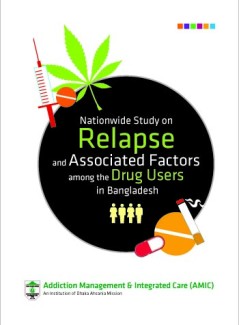The Nationwide Study Report on Relapse and Associated Factors among Drug Users in Bangladesh

Geographical location and diverse cultural influence make Bangladesh vulnerable for substance use related problems. It is impairing public health, corrupting institutions, retarding socio-economic development, and in some cases, impacting state security. It has been observed that many patients relapse into previous substance using behavior after completing treatment. The study objective was to look into the factors which impede recovery.
Cross-sectional, descriptive study was conducted by interviewing 911 respondents under treatment for Substance Use Disorder. Patients with systemic and psychiatric diseases were excluded. Informed written consent was obtained from each respondent and treatment center authority ensuring confidentiality.
Out of 911 patients, 98.9% were male, 48% of the patient age was between 19 - 30 years. 70% respondents used parents’ money to buy drugs. 70% were unwilling to receive treatment for SUD. 89.4% respondents were smokers; top choices of substances were Amphetamine, Cannabis and Alcohol; and common routes of administration were smoking (90.6%) and swallowing (82%). 98.9% respondents received residential treatment previously and 65.8% among them received such treatment for 31-90 days. Top reasons for relapse were family unrest (29.5%), peer pressure (27.4%) and frustration (24.8%).
This study revealed the picture of relapse and associated factors among substance users under treatment in Bangladesh. Dhaka Ahsania Mission has always been playing a pivotal role to fight against the substance related problems, working in collaboration with many other organizations and the Government. The findings of this study will work as baseline for future researches and in assisting policy development addressing this national issue.